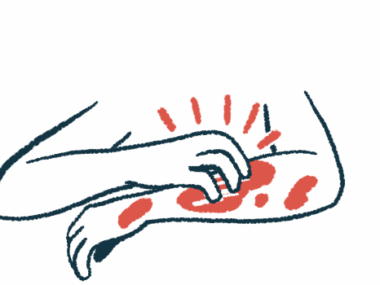Hearing the haunting words ‘failure to thrive’ to describe your baby
Having a plan for weight gain and nutrition is vital with Alagille syndrome
Written by |

Feeding your newborn child can be stressful. There are so few things they can control in their young lives.
It’s common for children to learn they can say no to food, which is a frustrating situation for the parents when the child is healthy. But for a child with liver disease, which makes it hard to gain weight, the experience becomes even more stressful.
Our son Finley was born weighing just 5 pounds. It took three months for us to learn he had Alagille syndrome and another two months to fully figure out his nutrition plan. Those early days are the hardest for me to recall. The memory of my child being underweight and severely jaundiced will forever stir up hard emotions.
“Failure to thrive“: what an intense term. It means the child’s growth is decelerated or even arrested. When you hear it for the first time, it’s hard not to assume that you’ve failed as a parent. After all, your job is to care for a new life. Having this term associated with my child while the reason for his condition hadn’t yet been identified was like having a perpetual black cloud over my head.
The nutrition ordeal — and improvement
When Finley was finally diagnosed, we were able to dive fully into his nutritional support through the lens of liver disease. While he’d been on a specialty formula that helps with malabsorption issues since his time in the neonatal intensive care unit, he was receiving nowhere near the number of calories that he needed. We ended up providing 30 kilocalories per ounce.
To mix that much formula, we had to use an adult protein shaker. If we’d been unable to get the formula covered under our insurance plan through our children’s hospital, providing our child with necessary, life-changing nutrition would’ve been extremely expensive.
The appropriate dosage of formula, coupled with adding the necessary vitamins and medications, allowed Finley to start gaining weight. He still wasn’t meeting the parameters of the U.S. Centers for Disease Control and Prevention growth chart, but he was gaining weight and following his own growth curve, which was a major relief. But the anxiety around nutrition is a continued presence in our lives.
Yet even when you think you have every detail figured out regarding how to take care of a child with a rare disease, life seems to always throw you a curveball. In 2022, we had the horrendous experience of navigating a formula shortage.
We’d been receiving a monthly shipment of formula, but one month, it didn’t come.
The formula was on back order, and there was no timeline for when it’d be in stock. That’s when our panic set in. What would we do if we couldn’t get enough to sustain Finley’s needs? The specialty formula he required to thrive was in short supply, and we couldn’t just walk into a store and buy it. It had to be ordered.
The panic intensified when we saw that Amazon would only allow us to buy two cans at a time, barely enough to get us through a single week. The company that made it listed it as out of stock.
Thankfully, we were able to enlist the help of wonderful friends and family members in different parts of the state, who bought several cans for us. With their help, we were able to navigate the shortage. Overall, though, it was an awful experience, and I hope no parent ever has to experience it.
Finley is our second child. Our oldest son, Jackson, has always been a picky eater, which we knew was normal when children move to solid foods. But parents want to make sure their child is getting enough nutrition, and stress levels are heightened when the child needs that nutrition in a way that others don’t. Such is the case with a child living with Alagille syndrome.
Finley is not as picky as his brother, but he is selective. We’ve learned ways to add fats to his diet, but what happens if he doesn’t want to eat? This anxiety is something my wife and I are still working to handle. Our dietitian has helped ease our concerns with reminders that we can’t force children to eat. Finley is in control of how much he needs.
But the phrase “failure to thrive” will always linger in our brains when it comes to his nutrition. We never want to go back to that point of our journey.
Today, Finley is doing great with his weight, growth, and nutrition. At 3 years old, he’s still small based on the growth chart, but he’s continuing to follow his own growth curve. That’s what our doctors want to see, and they’re happy with his progress. We’re proud of him and his growth.
Note: Liver Disease News is strictly a news and information website about the disease. It does not provide medical advice, diagnosis, or treatment. This content is not intended to be a substitute for professional medical advice, diagnosis, or treatment. Always seek the advice of your physician or other qualified health provider with any questions you may have regarding a medical condition. Never disregard professional medical advice or delay in seeking it because of something you have read on this website. The opinions expressed in this column are not those of Liver Disease News or its parent company, Bionews, and are intended to spark discussion about issues pertaining to liver disease.






